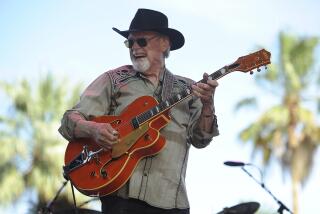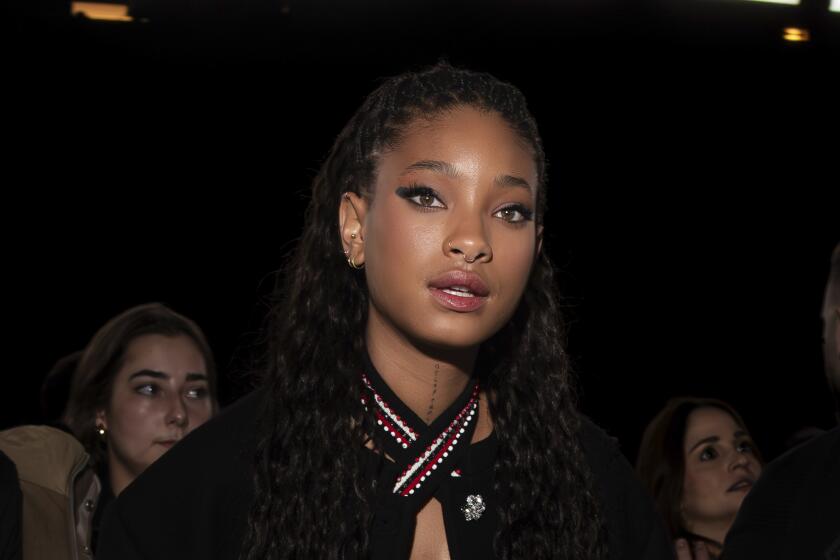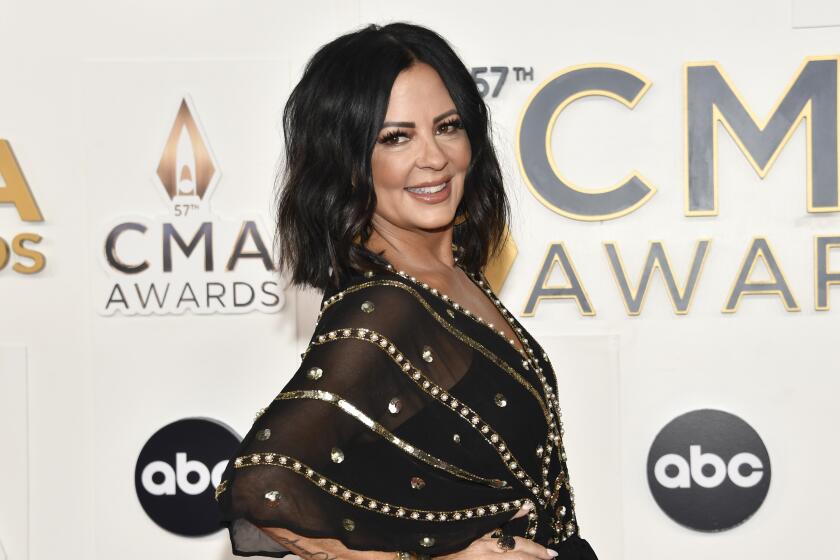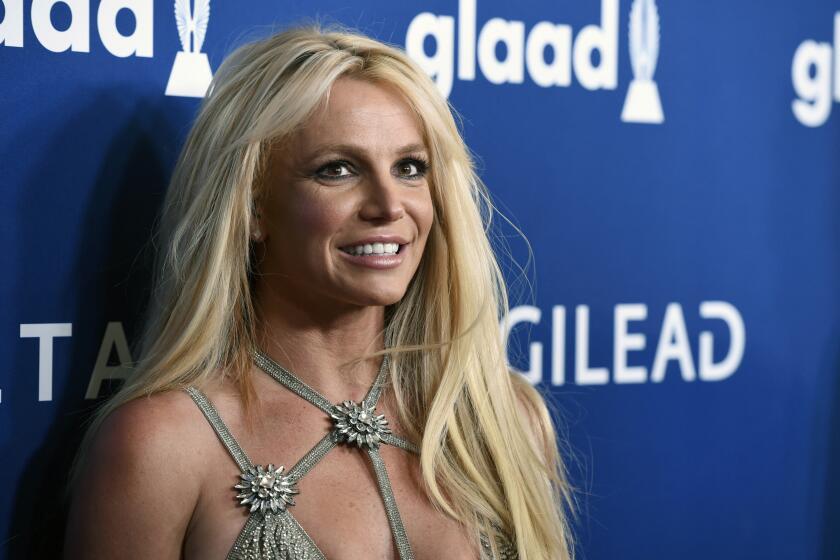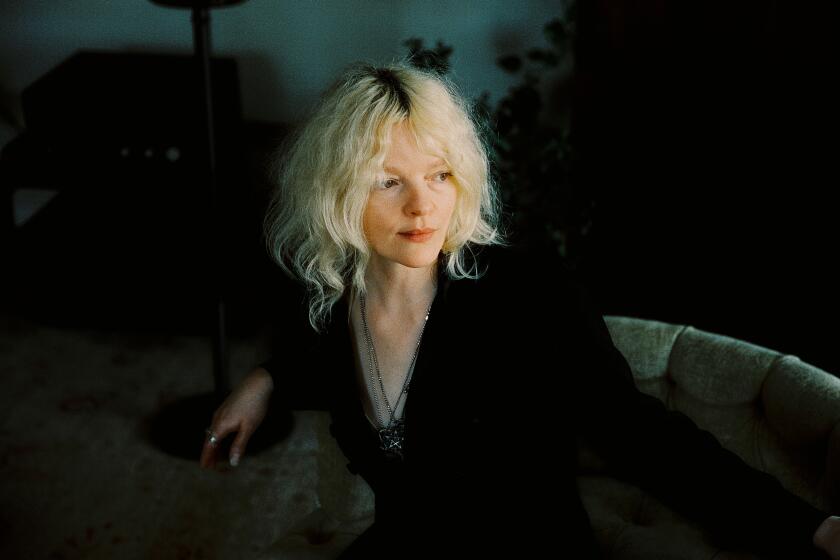Q & A WITH BUCK OWENS : Twang Time With the Ol’ Buckaroo
Buck Owens rolls his eyes playfully when asked if he knew he had come up with a country classic in 1964 when he wrote the heartache ballad “Cryin’ Time.”
“No way,” he says in his office here, where he has lived since the early ‘60s. “I just saw it as the back side of the next single. Nobody called it a classic until Ray Charles recorded it two years later.”
The song is one reason Owens, 63, will be honored at a “Singers’ Salute to the Country Songwriter” ceremony tonight at the Dorothy Chandler Pavilion in Los Angeles. The program, which raises funds for the Betty Clooney Foundation for Persons With Brain Injury, is also saluting Johnny Cash, Hank Cochran, Harlan Howard and the late Roger Miller.
Though best known as co-host of the “Hee Haw” TV series, Owens was a major force in country in the ‘60s, when he recorded 21 No. 1 hits, most of which he wrote or co-wrote, including another classic, “Together Again.” Owens, who has been in semi-retirement from the music business since the early ‘80s, owns five radio and TV stations. On the eve of tonight’s ceremony, he spoke about country songwriting and the current boom in the music.
*
Question: What is it that makes a great country song?
Answer: It’s always been like the old saying, “If you have to ask how much it is, you can’t afford it.” It’s just something that touches you . . . something that seems absolutely believable . . . and makes you think, “Yeah, that’s exactly how I feel about it.”
Q: How did you go about writing “Cryin’ Time”?
A: To me, songwriting was always more inspiration than perspiration. In this case, I was on a tour with Bobby Bare. We were up in Wisconsin and I had been on the road for three weeks and wanted to get home bad. I knew there was a 2 a.m. plane out of Chicago, nonstop to L.A., and I figured I could make it if I opened the show rather than closed it like I normally did.
So I switched places with Bobby and took this rental car and headed down the highway about 80 miles an hour. I was thinking, “Man, there’s going to be big cryin’ time if I don’t make that plane.” It was just an old saying and it just came out.
Q: Did you write it down while you were driving?
A: No. I always figured that if I could later remember enough of the song to reconstruct it, then maybe I had something. When I sang it again at home a couple of days later, it just came boom . . . “It’s cryin’ time again, you’re gonna leave me.”
Q: Had many other people sung it before Ray Charles’ version?
A: I don’t think so. When I heard his version, I was blown away. It was the same thing as hearing the Beatles do “Act Naturally” (a Johnny Russell-Voni Morrison song Owens had recorded).
Q: Did you like Ringo’s version?
A: Actually, my first thought when I heard “Act Naturally” was I wondered why Lennon or McCartney hadn’t sung it. But I grew to like Ringo’s version. Don Rich (Owen’s longtime guitarist and musical partner) and I were great Beatles fans. We carried them around with us on the bus. . . . I always liked good rock ‘n’ roll, which got me in trouble with a lot of the country DJs in those days.
Q: Why was that?
A: It went all the way back to the ‘50s when there was a real country versus rock war at the stations. You couldn’t record anything that might sound a little rockabilly or the DJs accused you of trying to go with the rockers and wouldn’t play your records. That’s why I used the name Corky Jones when I recorded “Hot Dog” (in 1956). I figured if the record became a hit, I could say, “Yeah, I’m Corky.” If nothing happened, I wouldn’t make anybody mad.
Q: Why was there always such a sense of energy or dance in your music?
A: I grew up listening to Bob Wills’ music, which was meant for dance, not show. Plus it was dance music that people wanted to hear when I started playing honky-tonks. At the Blackboard (club) in Bakersfield, we did rumbas, tangos, sambas, whatever it took. And when Little Richard and Bill Haley and Chuck Berry came along, people wanted to dance to rock ‘n’ roll. So it became part of what I did. To my mind, my music was always country music with a rock ‘n’ roll attitude, if you will.
Q: Are you surprised at the mass pop acceptance of country music today?
A: Yes. I never thought I’d ever live to see that day, but I always wanted the music to be recognized for its worth.
Q: Do you see any danger in what is happening now?
A: Sure. A lot of it reminds me of rock ‘n’ roll in the early days. In the ‘50s, the record labels were looking for another Elvis and I must have played guitar on hundreds of sides that I never heard again. There was so much money to be made and they were all looking for another golden egg.
And the same thing could happen to country music. You get all these CPAs and lawyers seeing how much money there is to be made, and they try to reduce it to a science. We used to talk about the rock people and how they tried to create a Fabian, and you see it happening in country and it troubles me. The first thing they look for is a guy who is nice looking. The singing is secondary. So, what you end up with is the guys who don’t look too good stood behind the guys who can’t sing, but look really good.
Q: What about your own career? Some people say that your years on “Hee Haw” killed your record sales.
A: In retrospect, I think I knew it would. I remember what happened to all the other singers with TV shows . . . the Perry Comos and the Glen Campbells. When you are there in people’s home every week, they take you for granted. It lays you wide open, like an X-ray. They see every little thing about you and it removes the mystique and the uncertainty. It killed a lot of record sales. But I did it willingly because the pay was real good--and you don’t have to travel.
Q: Do you ever regret walking away from it all in the early ‘80s?
A: Oh some times, but I think my time was up. I prefer people to think of me as someone who did his thing and it’s done. I just never wanted to be like the old punch-drunk fighter who stayed around one fight too long.
More to Read
The biggest entertainment stories
Get our big stories about Hollywood, film, television, music, arts, culture and more right in your inbox as soon as they publish.
You may occasionally receive promotional content from the Los Angeles Times.


